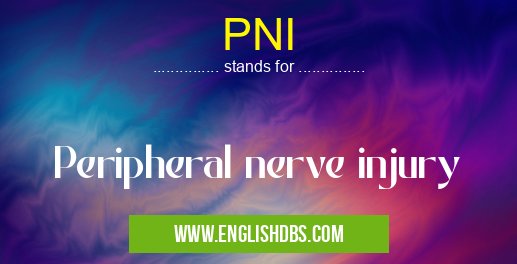What does PNI mean in PHYSIOLOGY
Peripheral nerve injuries (PNI) are serious and often disabling medical conditions that cause varying degrees of physical paralysis, pain, and loss of sensation. PNI is caused by trauma or disease affecting the peripheral nerves that control movement and sensation in the upper and lower limbs, trunk, face, neck, and other parts of the body. Peripheral nerve injuries can range from mild to severe and include a variety of debilitating symptoms.

PNI meaning in Physiology in Medical
PNI mostly used in an acronym Physiology in Category Medical that means Peripheral nerve injury
Shorthand: PNI,
Full Form: Peripheral nerve injury
For more information of "Peripheral nerve injury", see the section below.
» Medical » Physiology
Symptoms of PNI
The symptoms associated with PNI depend on which nerves have been damaged; however, in general they may include: muscle weakness or paralysis; numbness; tingling; loss of balance; pain; difficulty controlling bodily functions such as urination or defecation; difficulty with fine motor skills such as writing or buttoning clothing. In some cases there may also be changes in skin color due to decreased blood flow leading to discoloration in affected areas, swelling at the site of injury, impaired coordination of voluntary movements (ataxia), decreased sensation (hypoesthesia), heat sensitivity when exposed to hot surfaces (thermal allodynia), and increased sensitivity when touched lightly (tactile allodynia).
Treatment Options
Treatment options for PNI depend on what type of nerve was injured and what degree of injury occurred. Generally these treatments can range from rest and physical therapy to more invasive procedures such as surgery or drug therapy depending on the severity of the injury or disease process causing it. Non-invasive treatments first involve supportive care while attempting to stimulate healing through electrical stimulation techniques, topical creams containing natural ingredients such as capsaicin cream, cold laser therapy, acupuncture treatment, massage therapies such as myofascial release and craniosacral therapy among others. More advanced treatments may require surgeries like decompression surgeries either performed through open incisions (surgical laminectomy) or minimally invasive endoscopic procedures.
Essential Questions and Answers on Peripheral nerve injury in "MEDICAL»PHYSIOLOGY"
What is Peripheral Nerve Injury?
Peripheral nerve injury refers to an injury that affects the peripheral nervous system, which consists of the nerves and ganglia outside of the brain and spinal cord. This type of injury can cause pain, numbness, muscle weakness, and a variety of physical abilities.
How Does Peripheral Nerve Injury Occur?
Peripheral nerve injury can occur as a result of direct trauma to the affected area or from compression due to repetitive motion or prolonged immobilization. It may also be a complication due to other medical conditions such as diabetes, multiple sclerosis, or stroke.
What are Symptoms and Signs of PNI?
Symptoms and signs associated with peripheral nerve injuries vary depending on the location and extent of the injury but typically include numbness, tingling or burning sensations in the affected area; persistent pain; loss of motor control; muscle spasms or weakness; temperature sensitivity; and changes in skin coloration.
Are there any Risk Factors for Developing PNI?
Yes, individuals who have diabetes or chronic diseases involving inflammation are more likely to experience peripheral nerve injuries due to vascular complications that can damage nerves. Additionally, people who engage in certain occupational activities involving repetitive motions such as typing or playing sports may be at risk for developing compressed nerve injuries.
How Can PNI Be Diagnosed?
When diagnosing peripheral nerve injuries, doctors will typically take a patient’s history in order to help differentiate between this condition and other forms of neuromuscular disorders. An electromyography (EMG) test may also be used to assess electrical activity within the muscles and nerves surrounding the site of injury for further evaluation.
What Are Treatments for PNI?
Treatment plans for peripheral nerve injuries typically involve both conservative measures such as rest, splinting/bracing for stabilization purposes, physical therapy and targeted exercises in addition to possible medications such as anti-inflammatory medications or pain relievers if necessary. Surgery is recommended if further damage leads to lasting symptoms that do not improve with non-surgical treatments.
Is There Anything I Can Do To Prevent PNI?
In general it is important to take steps towards preventative care by avoiding activities that involve repetitive motions over long periods of time whenever possible, managing chronic health conditions such as diabetes carefully if present, stretching regularly prior to any rigorous activity as well as engaging in regular exercise aiming at strengthening the muscles around your joints in order reduce strain on nerves.
How Long Does Recovery Take For PNI?
The length of recovery depends heavily on the severity of your injury along with other individual factors such as age along with overall health condition however typically ranges between several weeks up until several months depending on how quickly your body responds treatment methods followed which are prescribed by your doctor accordingly.
Are There Any Possible Complications From Having PNI?
Yes depending on how severe your injury is complications including increased risk for infection resulting from limited mobility around injured area, muscle atrophy, joint deformities due accumulating scar tissue formation, tissue death resulting from poor blood flow are all potential consequences if not managed properly.
What should I do if I Suspect I Have PNI?
If you suspect you may have sustained a peripheral nerve injury it is highly recommended that you seek professional medical assistance so that you can receive diagnosis followed by tailored treatment plan prescribed based upon individual findings.
Final Words:
Peripheral nerve injuries can cause significant pain and disability but with proper diagnosis managing these conditions can lead back towards regaining normal functioning levels whether that involves surgical interventions like laminectomy decompressions or non-invasive approaches like therapies targeted at stimulating healing processes internally within the body’s own mechanisms. Even though PNIs are determined by genetic predispositions in certain individuals heightened awareness towards prevention measures reduce risks associated with developing them over time so take necessary caution when engaging in activities that might put you at higher risk for developing a peripheral nerve injury.
